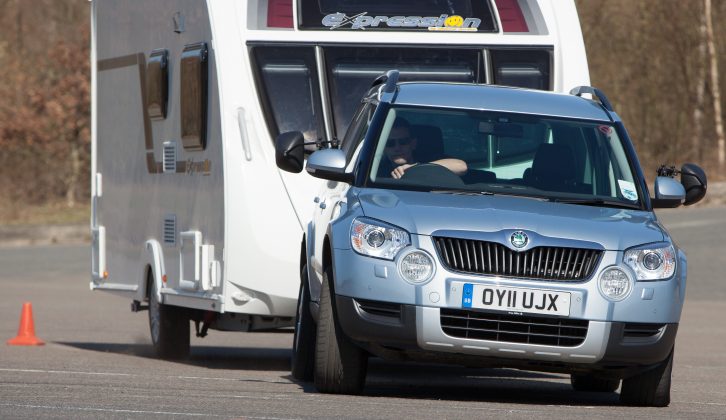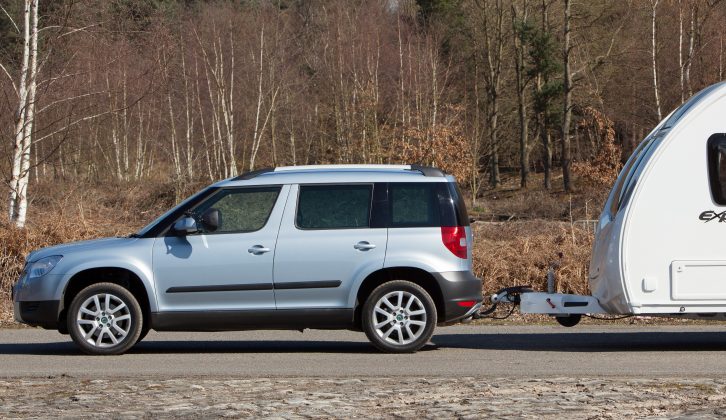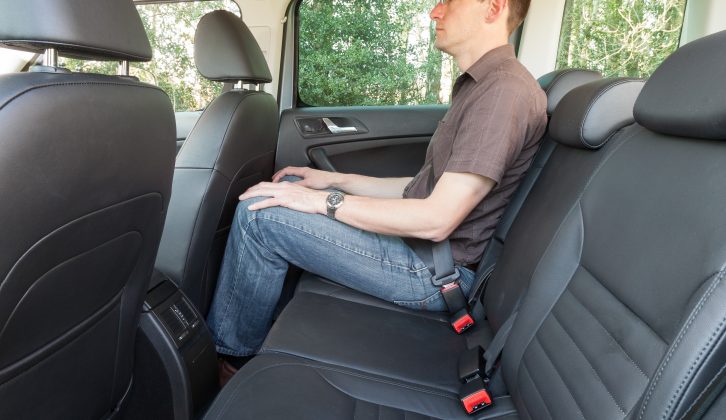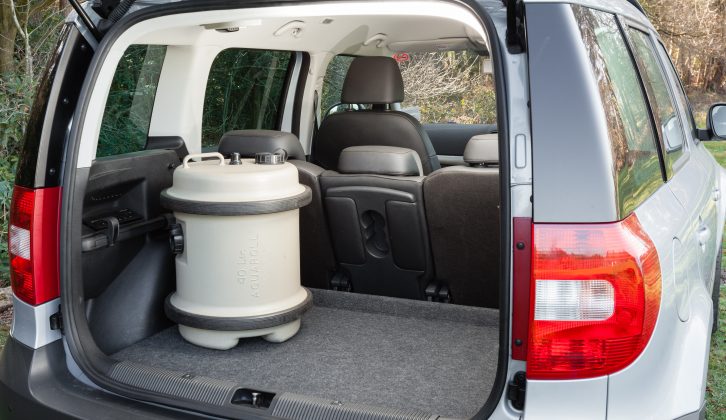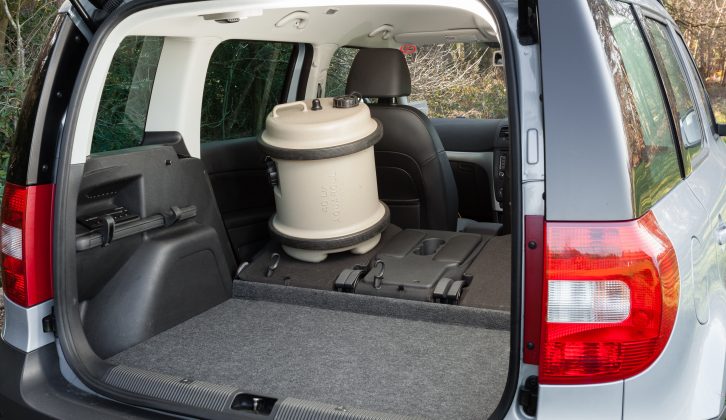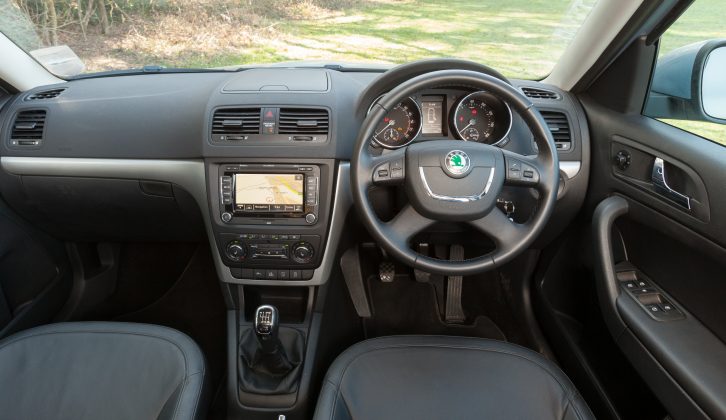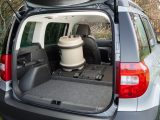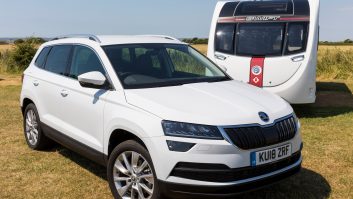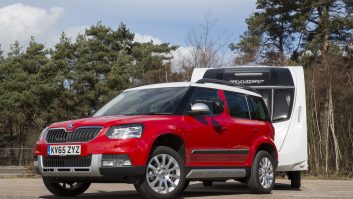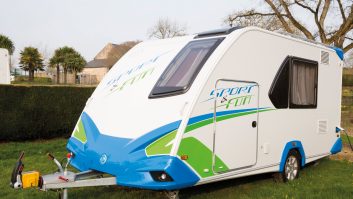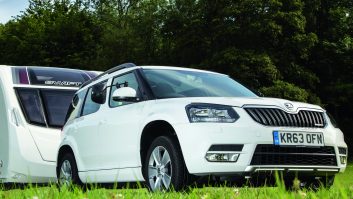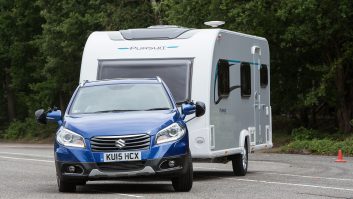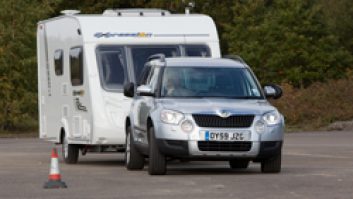Verdict
The experts from Practical Caravan had no doubts about the Škoda Yeti: they pronounced it a very capable tow car. It’s quick and stable, as they noted in the demanding emergency manoeuvre, and has the grunt to reverse with a caravan up a slope, without burning its clutch.
There is room for improvement, though. Removable rear seats have had their day; plenty of crossovers have seats that fold flush with the floor, and it’s a shame the Škoda’s don’t. The cabin is noisy at speed, too.
However, we can forgive these when the Škoda is such fun to drive, thanks to its fine steering and handling. And you get all this for a reasonable £23,675.
Pros
A stable and self-assured tow car
Responsive steering and well-controlled body movements
Plenty of room to get comfortable in the front or rear
Good fuel efficiency and a low insurance group
Cons
Luggage space is limited and with seatbacks folded the floor has a step in it
Three rear-seat passengers will be squeezed because of the narrow cabin
The engine could be more refined
It’s time for Practical Caravan’s experts to review the Škoda Yeti, which has been around a few years and is a strong all-rounder.
This car is a compact crossover whose half-pint off-roader looks aren’t just for show. It is tougher than many of its rivals, which resemble shrunken 4x4s but are really just hatchbacks with SUV-lite styling.
Here we’re testing the Škoda Yeti 2.0 TDI 170 4×4. Our review team was expecting the Škoda to tow well whatever the weather, to have a practical and comfortable cabin, to provide ample luggage space and to keep running costs modest.
The Škoda Yeti is very capable, quick and stable, and it has the grunt to reverse with a caravan up a slope
Towing
Despite carrying the extra weight of the four-wheel-drive transmission, the Yeti is not especially heavy. Including 75kg for the driver, the Yeti has a kerbweight of 1535kg, which gives an 85% match figure of 1305kg. The towball limit is a very respectable 80kg.
The Škoda’s 2.0 TDI engine is available in several states of tune. Here Practical Caravan reviewed the range-topping 168bhp version – and this muscle is obvious almost as soon as you start towing.
We hitched the Yeti up to a Swift Expression 514 with a mass in running order (MiRO) of 1250kg. The car pulled from 30-60mph, as you might when joining a motorway, in 10.6 seconds. It displayed impressive in-gear acceleration, too. Pulling from 50-60mph in fifth gear, as you might after being stuck behind slower traffic, took 9.4 seconds.
Let the revs drop below around 1500rpm, as when towing uphill, and the Škoda still pulls cleanly; there was no need to change down a gear. And if you need to stop in a hurry, you can rely on the Yeti – in our emergency braking test, it stopped from 30mph in 10.3m.
In another simulated emergency, the lane-change test, the Škoda felt composed, changed direction eagerly and gripped ferociously. As our reviewers drove aggressively, the caravan could be felt tugging at the back of the car, but it never appeared likely to take charge.
The Yeti proved secure enough at motorway speeds. Although some steering corrections were needed from time to time, the car never felt nervous or unsteady at the legal limit.
In the hill-start test, the handbrake failed to hold the outfit when first applied. With a second firmer pull, it stopped rolling backwards on the 1-in-10 slope and towed to the top of the slope without complaint. When reversing up the same hill, there was no hint of protest from the clutch.
By the end of the Practical Caravan tow car test, we felt the Škoda Yeti and proved to be a reliable, stable and powerful tow car.
Everyday Driving
If you’re deciding what tow car to buy, you must also consider what the car is like to drive solo, as well as under tow – the Yeti pleased our test team. Without a caravan to pull, the engine feels punchier, ready for any overtaking opportunity. And, according to Škoda, it should reach 62mph in 8.4 seconds.
The diesel engine is fairly quiet at a steady speed, but makes its presence felt when working hard. It’s far louder than the same engine fitted to the Volkswagen Passat, for example. Turning down the dial on road noise would improve it as, compared with the likes of a Peugeot 3008, the Škoda isn’t as refined as it could be on the motorway. In isolation, though, it is acceptable for long-distance travel.
The Yeti grips and goes. Its body movements are kept under control but without dampening the car’s agility. The steering responds immediately. That said, the Škoda’s ride is on the firm side of comfortable. Some will prefer a smoother ride over sharp bumps, especially at low speeds. Yet despite this, overall, it’s a good solo drive.
Space
Most drivers should be able to get comfortable behind the wheel of the Škoda Yeti, say Practical Caravan’s reviewers. Headroom is plentiful and, unless you have exceptionally long legs, there’s room for a relaxed driving position. The driver’s seat has enough height adjustment for a lofty, 4×4-style position and a good view out.
Passengers in the back don’t fare as well for legroom, although they do get air vents to keep cool. The cabin is narrow, so a third person in the rear will have to squeeze in. With just two in back, the middle rear seatback can be folded down to form an armrest with two cupholders.
On the dash, chrome-ringed dials add a touch of class to the well-made cabin and the lidded storage area on top of the dashboard, which is ideal for travel documents, provides a touch of convenience.
Further luxury is the addition of a four-spoke steering wheel, with controls for the radio and mobile telephone – a £165 option. Another option is the sat-nav(£1530); the testers would have preferred a screen mounted closer to the driver’s line of sight.
At 416 litres, the Yeti’s boot space is limited. You can buy estate cars for similar money with far more luggage space. However, you can fold the backs of its individual MPV-style seats to create more space, but with a step in the load floor.
An alternative is to tilt the seats entirely, which provides even more room. Unfortunately, this only works if the front seats are far enough forward on their runners.
Finally, you can remove the seats completely and you’ll have 1760 litres of space to fill, but you’ll need somewhere to store them. Foldaway seats would be a much better solution.
Running Costs
Our reviewers noted with approval the Škoda Yeti’s attractive list of standard equipment, which includes leather upholstery – in rivals, it could be an option costing as much as £1000.
Official figures put the Škoda’s combined fuel consumption at 47.9mpg, and it performed beautifully for the testers around the towing economy route, achieving 28.3mpg. Expect to save even more on premiums, because the Yeti is in insurance group 16.
Technical Specifications
| Engine Size | 1968 cc |
| Kerbweight | 1535 kg |
| 85% KW | 1305 kg |
| Towball Limit | 80 kg |
| Maximum Towing Limit | 2000 kg |
| Power | 168 bhp |
| Torque | 258 lb ft |
| Offical MPG | 47.9 mpg |
| CO₂ | 155 g/km |
